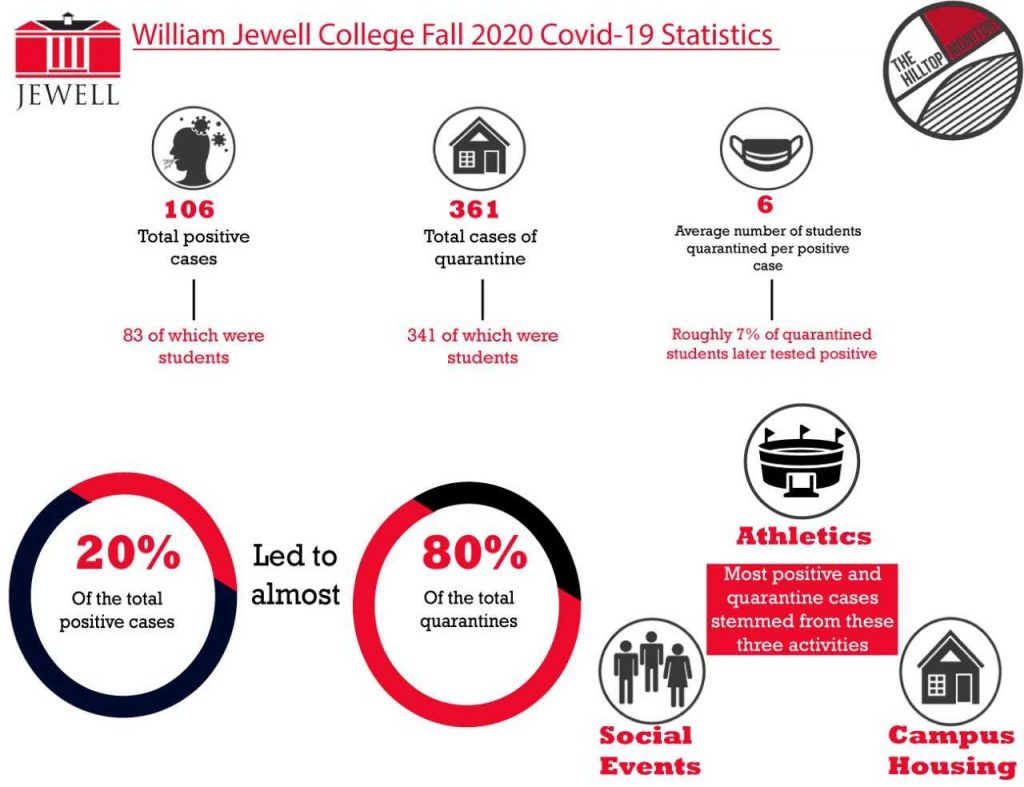
In a Campus Residents’ Meeting hosted Jan. 18, Ernie Stufflebean, associate dean of students and director of student life, shared some statistics regarding COVID-19 at William Jewell College.
The following data was provided by Landon Jones, director of campus safety.
During the fall 2020 semester, there were a total of 106 positive COVID-19 cases at Jewell. Out of the 106 cases, 83 were students, and 23 were employees.
Because of close contact with the aforementioned positive cases, 361 people were quarantined including 341 students and 20 employees.
On average, each case resulted in six students being quarantined due to close contact. Of those quarantined, approximately seven percent then tested positive while in quarantine.
Of the 106 positive cases, 12 cases, or 20 percent of all positive cases, culminated in 280 quarantined as a result of close contact, or 75 percent of all quarantined cases. Of these 280 cases, 23 went on to test positive.

An analysis of the top 20 percent of all positive cases on campus yielded the following information:
The majority of the contagion that led to positive and quarantine cases can be traced to one of three activities:
- Athletic team activities including practice, travel and competition.
- Social activities including off-campus activities where students go to restaurants and recreational sites such as bowling alleys. Social activities also include the times in which students travel in vehicles to get to off-campus and on-campus locations. Finally, social activities also include students hanging out in dorms and engaging in recreation such as watching movies, eating and drinking.
- Campus housing activities including cohabitation, meaning that living arrangements between roommates, housemates, or suitemates can be conducive to contagion and quarantine.
The analysis indicated that there was no evidence of COVID-19 spread in classrooms, labs, music ensembles, nursing programs, early education programs or in the dining hall.
Stufflebean says that this piece of information is quite promising, in that it indicates Jewell’s Operation Safe Campus is an effective plan for mitigating COVID-19 spread on campus.
According to Landon Jones, as of Feb. 9, 2021, the college has administered approximately 3,500 COVID-19 tests.
As the Jewell community heads into the spring semester of 2021, Stufflebean would like to remind the Jewell community of a couple of key points that will be crucial to keep in mind in order to continue to keep the spread of COVID-19 at a minimum.
First and foremost, students should be aware of the Threat Levels which the college is operating under. Currently, Jewell is at Threat Level B, meaning that while students can entertain visitors in residential areas, these visitors can only be fellow Jewell students.
When in another student’s sleeping room, both visiting students and hosting students must wear masks and maintain social distancing measures. This means that typically only one guest can be safely accommodated in a sleeping room at a time. Under Threat Level B, no off-campus visitors are allowed. This is to protect the college from any off-campus threats and to create a so-called “Jewell bubble.”
If a student feels ill, then the student should not host students in their sleeping room or visit other students’ sleeping rooms. Instead, the student should contact the Student Health Center as soon as possible to ensure that the illness is not COVID-19. Before receiving a positive or negative COVID-19 test the student should isolate as much as possible to prevent the possible spread of COVID-19.
Under Threat Level C, indicating an uncontrolled spread of COVID-19 on campus, students would not be allowed to have visitors, regardless of whether they are part of the Jewell community or not.
In both Threat Levels B and C, students are reminded that it is obligatory for students to wear facial coverings inside of enclosed buildings, including residential areas.
This means that if one does not live in an area with connected restrooms, and one lives in a residential area with communal restrooms, one must wear facial coverings unless one is taking a shower or brushing their teeth.
For further resources related to COVID-19 preparedness, Stufflebean recommends that students sign-up for the Campus Resident Resource course on Moodle. There, students can find information on Jewell’s threat level matrix, facial covering policy, COVID-19 testing policy and more.
